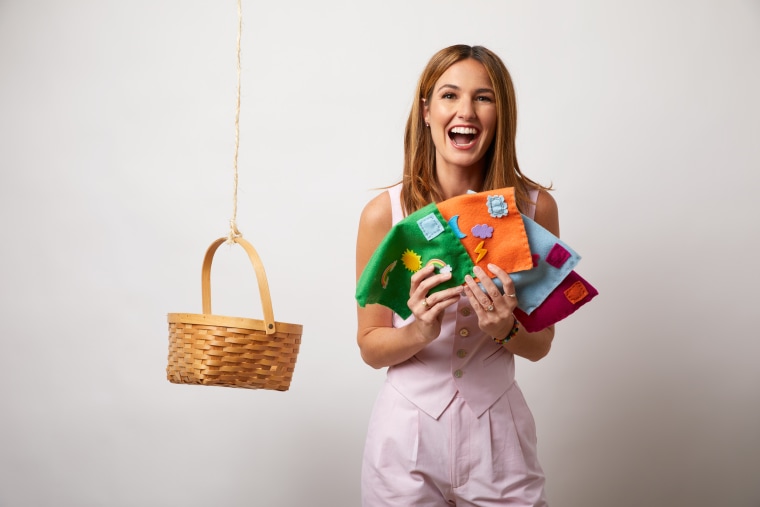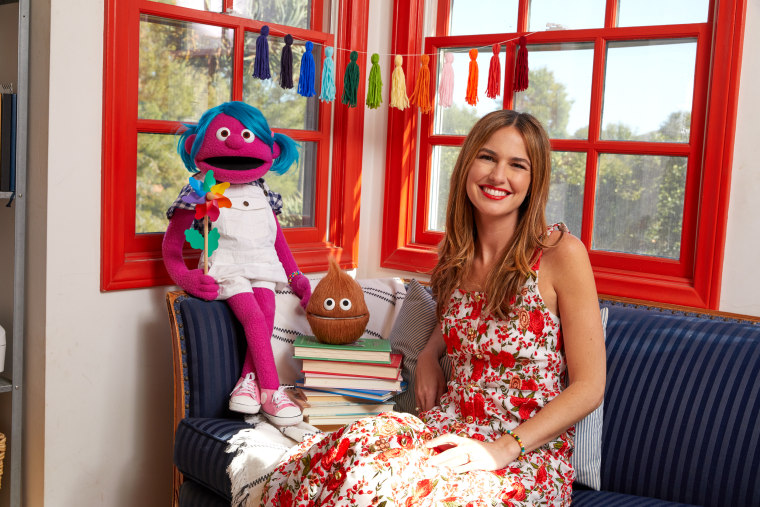Where can you find a talking coconut and a pink puppet asking a NASA expert about space — while speaking in Spanish with a sprinkling of English?
“Club Mundo Kids," a new educational series aimed at first- and second-generation Latino children, premieres April 10 on Televisa and April 11 on Universo, a channel owned by NBCUniversal, the parent company of NBC News.
Hosted by Romina Puga from her "clubhouse," the show follows "Romi" (Puga) and her two neighbors, Coco, a coconut shaped puppet who claims to be the brave one out of the bunch, and Maya, a plush puppet who loves going on adventures.
Romi and her puppet friends explore topics such as space exploration, endangered animals, arts and sports by talking to experts or working on projects, including creating a small house out of recycled items or learning you can't grow a mustache by planting one.
"There really isn't anything like this, especially for this audience," Puga, 31, told NBC News. "We really put a lot of love and thought into all of it. It all comes from a very genuine and authentic place where we just want kids to enjoy this."
Each episode involves children submitting questions to be answered by experts. The list includes NASA's human space flight mission manager Rosa Ávalos-Warren, a Peruvian American; wildlife expert Ron Magill; conservationist Jack Dalton, who is working to get orangutans off the endangered species list; child activists from Greta Thunberg's Fridays for Future; and members of the tree-planting foundation Plant-for-the-Planet.
Puga, a former ABC News correspondent, says being the show's bilingual host is her dream job. She watched similar educational, yet whimsical, shows, such as "Bill Nye The Science Guy" and "The Magic School Bus," and would often recreate the things she saw. That's why the crafts on set, ones she mostly makes herself, are supposed to look like ones viewers can create at home.

Reflecting the diversity of the Spanish language
The show is meant for Spanish speakers who are growing up speaking it as their first language, but the program brings in certain English keywords that children might hear in school, like the Endangered Species Act — as well as highlight the different dialects in Spanish to reflect the diversity of U.S. Latinos.
The Miami native host, whose parents are from Chile and Argentina, shares in a nutrition-themed episode that her favorite food is corn, which she calls "choclo," while sharing that others call it "maíz" or "elote."
"We do a lot of that," she said. "Just opening their minds to, 'Hey, my classmate speaks Spanish but his Spanish doesn't sound like mine. Why is that?' And so we're explaining that but in a fun way, and our hope is to encourage empathy, curiosity and that feeling of identifying with this show, which embraces multicultural identities."
In 2018, more than 1 in 4 U.S. newborns were Latino. More than 8 in 10 Latino parents say they speak Spanish with their children, according to Pew Research, but the share drops significantly as immigrant connections become more distant — as well as when one parent is not Latino. However, a large majority want their children to know the language.
In 2015, the United States became the second largest Spanish-speaking country in the world after Mexico.
"They don't need to pick one or the other"
Puga recounted how she was raised speaking Spanish at home and learning English in school. She grew up eating the food of her parents' native countries and spent time with family members on the weekends. As other U.S. Latinos have said about growing up between cultures, she didn't quite identify with her schoolmates or with her South American native-born cousin.
As she got older, she met friends in Miami who had mixed identities like her. She said she finally felt like she could identify with this new group that embraced both or, in some cases, three cultures.
"To me, that's what I want 'Club Mundos Kids' to be — that group for kids, a place to identify, where they don't need to pick one or the other," she said. "They don't need to pick English or Spanish but they can celebrate and be proud of their multicultural identities. This whole show was built with them in mind and built for these kids so their stories could be told, and we could celebrate all of those identities that they feel."
Follow NBC Latino on Facebook, Twitter and Instagram.
